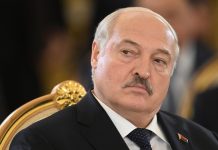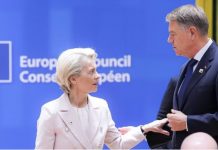With Putin assuming the helm of the supposedly premier world body for peace, is it time for reform?
What could be more absurd than Russia assuming the presidency of the United Nations Security Council – the world body tasked with preserving world peace – days after the International Criminal Court issued a war crimes arrest warrant against its leader Vladimir Putin?
Perhaps that during its last turn at the helm of the UNSC, in February 2022, Russia invaded Ukraine. The poor optics were not enough to compel Putin to wait for the Ides of March.
The two Russian presidencies bookend a year of horror in which Russia’s unprovoked invasion has cost perhaps a quarter million lives, devastated Ukraine, upset global markets from energy to wheat, and achieved the opposite of all of Russia’s aims.
So does the Security Council matter at all?
Ukrainian leader Volodymyr Zelensky complained bitterly about Russia assuming the presidency, terming it “absurd and destructive” that a “terrorist state” should chair the council. The reply from his Western allies was that nothing could be done – there is an automatic rotation. This is true, even though quirks of the system can yield strange results: the inquisitive may notice that only 13 months passed between Russian presidencies this time, compensation for a 15-month hiatus in the previous rotation.
With the presidency of the council, Russia can do much to set the agenda. Its officials have said they would further discussion of needed changes in a unipolar world (a swipe at the US) and on arms control (perhaps a swipe at NATO and Ukraine). It can hold up issues it dislikes – for example, resolutions criticizing Russia for alleged war crimes.
Then again, if any anti-Russian resolution did come up, even without the presidency Russia could simply veto it. That’s the key privilege of the five permanent members.
Some would say this business of the five permanent members is where the problems begin.
The countries in question – the US, Britain, France and China in addition to Russia – reflect the global economic order at the end of World War II.
That explains the absence of the three defeated Axis powers: Japan (with the world’s third-largest economy today), Germany (with the fourth-largest, about a third bigger than that of both Britain and France), and, just in order to show no disrespect, Italy (with the eighth-largest economy, despite a reputation for shambolism).
These countries certainly deserved a period on the sidelines, considering their epic misbehavior. Germany’s case is especially egregious, given the unfathomable crimes of the Holocaust. But for how long? Most would agree 1,000 years would be to0 long (though not all would agree that we would not have destroyed the planet by then, through no fault of the Axis powers). Is 100 years enough? We are at 78.
All three nations are now positive players on the world stage, certainly more so at times than some of the existing permanent members (and not only the obvious ones). And with the new security challenges facing the world, Germany and Japan are starting to experiment with coming out of their (also well-warranted) pacifist shells as well. That changes things.
A more reasonable Security Council, more accurately reflecting the hard, soft and economic power structures today, would clearly be different than the one Russia (with an economy presently just smaller than South Korea’s) is taking over.
It is not unreasonable to consider that the Permanent Five should be the US, China, the European Union, India and Brazil. That forum would account for most of the world economy. It would offer a needed and deserved strategic boost to the EU while punishing Britain for Brexit (which most nations of the world, I wager, would support). And it would be more internationally balanced, though Africa would still be missing. Conceivably it could be expanded to six to include Japan; perhaps one day Nigeria.
Alas, no such thing is likely under the current UN rules, which are very difficult to change. The existing permanent members must agree to changes. France (which loves the EU project) might – but for Britain (which is depressed enough about the inexorable right-sizing of its once-outsize influence) acquiescence would probably bring down the government. And to use British understatement, it is hard to see Russia agreeing to step down or dilute its power, by adding others (however Putin may disdain a setup that was concocted by the West).
Indeed, the only changes that ever occurred to the makeup of the permanent members attached to countries disappearing, in one way or another, and thus being unable to defend themselves.
One case occurred in 1971, when the world, led by the US, was eager to normalize Communist China. The “Republic of China” had been a founding member, but that country’s government had basically decamped to Taiwan by the end of the decade, routed by the communists on the mainland. So the UN kicked out Taiwan altogether, and all agreed that the “People’s Republic of China” (what a difference one seemingly innocent word can make!) should inherit its seat. The reader will decide how well that worked out.
A second case occurred 20 years later, when the Soviet Union fell apart. The USSR had never been a good-faith player in the world: no sooner had it assumed its position on the Council than it set about imposing communist dictatorships on the unfortunate peoples of Eastern Europe. In the romantic days of communism’s felicitous collapse, all agreed enthusiastically that Russia inherit its seat. What could go wrong with a country led by Boris Yeltsin? The reader, here too, can judge the result.
Does any of it matter?
The United Nations boasts online of “70 ways the UN makes a difference.” Many decry the bloated bureaucracy, and the New Humanitarian and other publications have exposed shocking abuses in many corners of it).
But overall, the UN’s list is reasonably impressive. The UN, and key organizations within it like UNICEF, makes a positive contribution to human development, global health, humanitarian issues, health, the environment, the problematic realm of international law, and more. It is a key cog in a perhaps naïve effort to effect some degree of global governance. That’s not nothing in a world whose components clearly depend on each other yet still jealously guard their sovereignty – because that’s what people do.
The Security Council is often described as the most powerful of the UN bodies. And sure, it’s more powerful than the General Assembly, which can mostly huff, and also puff. But can the council do that much more?
In theory, the Security Council is the body that authorizes wars, peacekeeping missions, sanctions and whatnot. But it can do little to compel member states to go along with any of it. Mostly it can dispatch apparatchiks, rumpled hat in bureaucratic hand, trying to persuade governments to pony up a few peacekeeping troops.
Consider the historical record.
The Security Council did not authorize the 2003 invasion of Iraq. Did that prevent the United States from mobilizing a 48-nation “Coalition of the Willing”? It most certainly did not. And whereas that war was a fiasco, this was not for lack of boots on the ground – nor even for the lack of UN legal cover.
The Security Council did authorize (in a retroactive way) the slightly earlier Afghanistan War. Did that prevent that campaign from ending up as an even more excruciating failure? Sadly, it did not. Was the Security Council even consulted when President Biden finally pulled the plug, in 2022? I recall no such thing.
The Security Council is essentially just a talking shop like the General Assembly, but with a more effervescent bouquet. Russia and China, with 40% of its seats, can be expected to use it as a forum for propagandizing their effort to further authoritarianism in the world. Their common quibble with democracy will be the new bipolarity in the world.
Is it all so terrible? The Security Council may not have done much good, but unlike so many other organizations and persons and projects and countries it has neither done much bad.
Russia took over the Council on April Fools’ Day. Perhaps worrying about it too much would be a fool’s errand, indeed. Let them blow off their steam while wearing suits, not uniforms, and perhaps one day they will leave Ukraine alone.
















